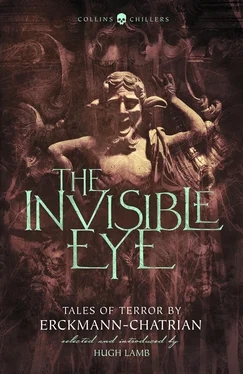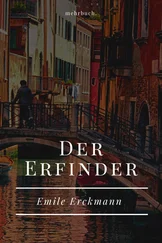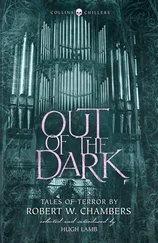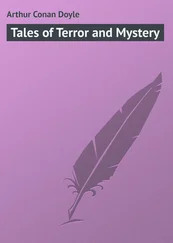It might have been said that these two ancient buildings reflected one another; only that behind the inn grew a tall oak, the dark foliage of which served to bring into bold relief the forms of the roof, while the opposite house stood bare against the sky. For the rest, the inn was as noisy and animated as the other house was silent. On the one side was to be seen, going in and coming out, an endless crowd of drinkers, singing, stumbling, cracking their whips; over the other, solitude reigned.
Once or twice a day the heavy door of the silent house opened to give egress to a little old woman, her back bent into a half-circle, her chin long and pointed, her dress clinging to her limbs, an enormous basket under her arm, and one hand tightly clutched upon her chest.
This old woman’s appearance had struck me more than once; her little green eyes, her skinny, pinched-up nose, her shawl, dating back a hundred years at least, the smile that wrinkled her cheeks, and the lace of her cap hanging down upon her eyebrows – all this appeared strange, interested me, and made me strongly desire to learn who this old woman was, and what she did in her great lonely house.
I imagined her as passing there an existence devoted to good works and pious meditation. But one day, when I had stopped in the street to look at her, she turned sharply round and darted at me a look the horrible expression of which I know not how to describe, and made three or four hideous grimaces at me; then dropping again her doddering head, she drew her large shawl about her, the ends of which trailed after her on the ground, and slowly entered her heavy door.
‘That’s an old mad-woman,’ I said to myself; ‘a malicious, cunning old mad-woman! I ought not to have allowed myself to be so interested in her. But I’ll try and recall her abominable grimace – Toubec will give me fifteen florins for it willingly.’
This way of treating the matter was far from satisfying my mind, however. The old woman’s horrible glance pursued me everywhere; and more than once, while scaling the perpendicular ladder of my lodging-hole, feeling my clothes caught in a nail, I trembled from head to foot, believing that the old woman had seized me by the tails of my coat for the purpose of pulling me down backwards.
Toubec, to whom I related the story, far from laughing at it, received it with a serious air.
‘Master Christian,’ he said, ‘if the old woman means you harm, take care; her teeth are small, sharp-pointed, and wonderfully white, which is not natural at her age. She has the Evil Eye! Children run away at her approach, and the people of Nuremberg call her Fledermausse!’
I admired the Jew’s clear-sightedness, and what he had told me made me reflect a good deal; but at the end of a few weeks, having often met Fledermausse without harmful consequences, my fears died away and I thought no more of her.
One night, when I was lying sound asleep, I was awoken by a strange harmony. It was a kind of vibration, so soft, so melodious, that the murmur of a light breeze through foliage can convey but a feeble idea of its gentle nature. For a long time I listened to it, my eyes wide open, and holding my breath the better to hear it.
At length, looking towards the window, I saw two wings beating against the glass. I thought, at first, that it was a bat imprisoned in my chamber; but the moon was shining clearly, and showed the wings of a magnificent night-moth, transparent as lace. At times their vibrations were so rapid as to hide them from my view; then for a while they would lie in repose, extended on the glass pane, their delicate articulations made visible anew.
This vaporous apparition in the midst of the universal silence opened my heart to the tenderest emotions; it seemed to me that a sylphid, pitying my solitude, had come to see me; and this idea brought the tears to my eyes.
‘Have no fear, gentle captive – have no fear!’ I said to it; ‘your confidence shall not be betrayed. I will not retain you against your wishes; return to heaven – to liberty!’
And I opened the window.
The night was calm. Thousands of stars glittered in space. For a moment I contemplated this sublime spectacle, and the words of prayer rose naturally to my lips. But then, looking down, I saw a man hanging from the iron stanchion which supported the sign of the Boeuf-gras; the hair in disorder, the arms stiff, the legs straightened to a point, and throwing their gigantic shadow the whole length of the street.
The immobility of this figure, in the moonlight, had something frightful in it. I felt my tongue grow icy cold, and my teeth chattered. I was about to utter a cry; but by what mysterious attraction I know not, my eyes were drawn towards the opposite house, and there I dimly distinguished the old woman, in the midst of the heavy shadow, squatting at her window and contemplating the hanging body with diabolical satisfaction.
I became giddy with terror; my strength deserted me, and I fell down in a heap insensible.
I do not know how long I lay unconscious. On coming to myself I found it was broad day. Mingled and confused noises rose from the street below, I looked out from my window.
The burgomaster and his secretary were standing at the door of the Boeuf-gras; they remained there a long time. People came and went, stopped to look, then passed on their way. At length a stretcher, on which lay a body covered with a woollen cloth, was brought out and carried away by two men.
Then everyone else disappeared.
The window in front of the house remained open still; a fragment of rope dangled from the iron support of the signboard. I had not dreamed – I had really seen the night-moth on my window-pane – then the suspended body – then the old woman!
In the course of that day Toubec paid me his weekly visit.
‘Anything to sell, Master Christian?’ he cried.
I did not hear him. I was seated on my only chair, my hands upon my knees, my eyes fixed on vacancy before me. Toubec, surprised at my immobility, repeated in a louder tone, ‘Master Christian! – Master Christian!’ then, stepping up to me, tapped me smartly on the shoulder.
‘What’s the matter? – what’s the matter? Are you ill?’ he asked.
‘No – I was thinking.’
‘What the deuce about?’
‘The man who was hung—’
‘Aha!’ cried the old broker; ‘you saw the poor fellow, then? What a strange affair! The third in the same place!’
‘The third?’
‘Yes, the third. I ought to have told you about it before; but there’s still time – for there’s sure to be a fourth, following the example of the others, the first step only making the difficulty.’
This said, Toubec seated himself on a box and lit his pipe with a thoughtful air.
‘I’m not timid,’ said he, ‘but if anyone were to ask me to sleep in that room, I’d rather go and hang myself somewhere else! Nine or ten months back,’ he continued, ‘a wholesale furrier, from Tubingen, put up at the Boeuf-gras. He called for supper, ate well, drank well, and was shown up to bed in the room on the third floor which they call the “green chamber”. The next day they found him hanging from the stanchion of the sign.
‘So much for number one, about which there was nothing to be said. A proper report of the affair was drawn up, and the body of the stranger buried at the bottom of the garden. But about six weeks afterwards came a soldier from Neustadt; he had his discharge, and was congratulating himself on his return to his village. All the evening he did nothing but empty mugs of wine and talk of his cousin, who was waiting his return to marry him. At last they put him to bed in the green chamber, and the same night the watchman passing along the Rue des Minnesängers noticed something hanging from the signboard-stanchion. He raised his lantern; it was the soldier, with his discharge-papers in a tin box hanging on his left thigh, and his hands planted smoothly on the outer seams of his trousers, as if he had been on parade!
Читать дальше












